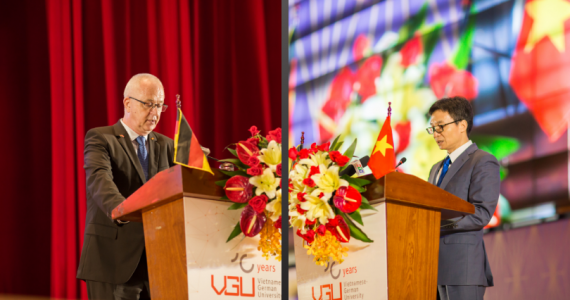
Binational cooperation in higher education: Vietnamese-German University
Over the last two decades, the Socialist Republic of Vietnam has added a new dimension to its foreign relations in pursuit of development policy. As part of the “New-Model University Project” (NMUP) and with the objective of improving higher education in Vietnam, the country has incorporated the establishment of binational educational institutions into its educational policy strategy and intensified international cooperation within various countries. In the last ten years, several universities were founded at which industrialised countries use their administrative and academic know-how and co-finance them.
The Vietnamese-German University (VGU) was the first Vietnamese university with foreign partners. It is a state-run university, located in Binh Duong, near Ho Chi Minh City, and is based on a German-Vietnamese cooperation agreement. VGU was founded and opened in 2008 starting with 35 enrolled students. The administrative and academic structure corresponds to the German university model and like German technical universities, VGU integrates research into lecturing. Today, the university has more than 1,300 students and eleven Bachelor’s and Master’s programmes in the fields of engineering and business administration. They are accredited in Germany and taught by about 100 lecturers and professors, partly by guest professors and partly by full-time Vietnamese and German professors.
VGU is only one successful example for universities with a foreign partner. The strategy is intended to gradually improve Vietnam’s higher education over the coming years. The universities are co-financed by the respective partner country and adopt their education policy concepts. VGU is supported by a non-profit association with more than 30 German universities. The association of the nine leading technical universities in Germany, the “TU9,” is also part of this association. The World Bank granted the university a credit of USD 180 million in June 2010, which will be used for VGU’s planned new campus.
The highly qualified graduates of such universities, who in the case of the VGU receive an internationally recognised German degree, are expected to drive Vietnam’s development as professionals and executives. The close cooperation between VGU and its German and Vietnamese partner companies is particularly intended to facilitate technology transfer and promote innovation, thus contributing to Vietnam’s further economic modernisation.
The concept of binational cooperation in higher education goes hand in hand with economic growth. Vietnam has one of the fastest growing economies in the world. The expansion of higher education and research is a key component in sustaining this growth and meeting the challenge of tertiarisation that Vietnam is increasingly facing. The extent to which Vietnam will benefit from the highly qualified graduates of these higher education institutions will also depend on the attractiveness of partner countries’ labour markets and the need for highly educated professionals as a high education level can trigger a brain drain from Vietnam. However, the chances are high that the positive effects of improved education and the intensified relations between the universities and the industry in both the partner country and Vietnam are accelerating the performance of the rapidly developing Vietnamese economy.

Nikita Goch
Former volunteer at the Vietnamese-German University (VGU)
